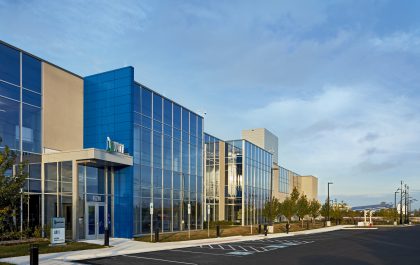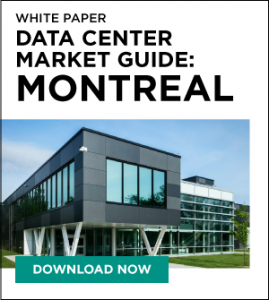What Does Operational Excellence Mean in a Data Center?
There’s a reason why government agencies, education institutions, nonprofit organizations and other sectors try to embrace the best practices of private industries. Companies are beholden to their bottom lines. They’re constantly driving to increase efficiency, streamline processes and embrace operational excellence. The concept being that the closer to optimal that a company can operate, the better its profit margins and the more successful it is.
But what constitutes operational excellence? How does a company achieve it?
To find out the answers to those questions, we recently sat down with Chris Yetman, chief operating officer at Vantage Data Centers. Chris is passionate about operational excellence and is dedicated to the perpetual improvement of Vantage’s operations and the services that the company delivers to its customers.
In the first part of our two-part discussion, we talked about how a company reaches operational excellence, what operational excellence looks like for a data center provider and how operational excellence impacts the experience for data center customers.
Interview with Chris Yetman
Data Centers Today (DCT): What is “operational excellence” as it pertains to data center providers?

Chris Yetman: Before we focus on data centers, let’s look at operational excellence in any environment. Operational excellence is a world where things are measured and can then be made better based on those measurements. The key is continuous improvement. Organizations that embrace operational excellence are always looking to elevate the level of service that they provide. They’re always looking to make things better and get things better under control.
Control is a big piece of operational excellence. This is especially true for data center providers.
There are many things that matter to data center customers that need to be controlled. Therefore, data center providers need to measure a significant number of performance metrics and then identify ways in which to improve them. They even need to measure things like process – which can greatly impact how good their service is – to ensure that the data center meets customer requirements.
For example, data center customers are looking for data center space that will be within a certain temperature and humidity range and that has power that is always available. Data center operators need to measure these things for proof of performance, but also to inform their ability to change and get better.
Customers don’t want downtime, they don’t want to think about that. They don’t want a temperature event. Data center providers are surrounded by machinery and, sometimes, things just break. It’s the reality of the world that we’re in. We can build tier three buildings that are incredibly maintainable. But how you maintain these things can impact the overall stability of your service, and that can be applied to operational excellence.
For example, we keep a calendar of the preventative maintenance that is required for all machinery. But we also have documented a philosophy, approach and rules to how we manage those devices. Some of them require more maintenance than others. Some require deeper maintenance than others. So, we work to ensure that those things are all done – that is a part of operational excellence.
DCT: Why is documenting a maintenance approach, rules and philosophy important? Why isn’t the calendar enough?
Chris Yetman: I’ll give you another example from my previous experiences prior to Vantage.
If there is monthly maintenance that’s required on an air handler, some employees may complete the list of tasks on January 31st and call it that month’s maintenance. Then, they’ll go around on February 1st and just check all the boxes for February since they just performed that maintenance the day before.
That’s sloppy. And that’s not operational excellence. If an organization was shooting for operational excellence, they would set up an environment where people can’t fake things.
For example, Vantage has avoided this problem by requiring that maintenance gets done within a short period around its scheduled time. Then, that maintenance physically can’t be done again until 30 calendar days later. If employees attempt to fake it, they fail. The whole point of monthly maintenance is to check it under operation once per month. Processes need to be designed to ensure that is the case. That is operational excellence.
So, processes need to be designed to enable operational excellence, but that’s not enough. Data center operators also need measurements for their processes. It’s not just about staying in an established temperature range. It’s also about how well the company is performing the processes of maintaining the equipment.
They should then be using the data that they generate to extract actionable insights that can impact the business and the data center – such as the failure rates of the equipment. A data center provider that is operationally excellent would use that data to learn more about devices and become more proactive – maybe even start replacing compressors before they fail.
Ultimately, a data center provider that is operationally excellent lives in a cycle of measurement, analysis, improvement and control. If you can’t measure, you can’t improve or control. An untested redundancy isn’t redundant, and an untested alarm is always off.
DCT: Is “operational excellence” just table stakes? Conventional wisdom states that data center customers want secure facilities, redundant power and cooling. Do these customers really need and want more than that?
Chris Yetman: I think they do.
Data center customers are customers because they don’t want to run a data center. What they want to do is run a fleet of servers and a network. If they’re too busy and too focused on power or temperature, they’re distracted from running their servers and are instead working with their data center provider. They don’t want to actually worry or think about their data center provider.
When data center providers are doing everything right, the customer doesn’t have to think about them, or worry if they’re going to experience an outage or event because the power is unstable, or the temperature isn’t correct.
For example, at Vantage, we built a portal for customers with a tremendous amount of data that they can use to check things. When they first come online as a customer, they use it all the time. We’ve noticed that over time their usage trails off – not because the information isn’t useful to them, but because it gets boring in its consistency. We view that as a compliment because their assumption is that it’s always working correctly.
DCT: We talked about power and cooling, but we didn’t talk about security. How important is a secure facility to customers? How can operational excellence impact a customer’s data security?
Chris Yetman: Data center facilities should be secure. They should have a focus on security. I’m not trying to downplay that at all. But, at the end of the day, a data center provider’s physical security is nothing compared to the customer’s own network security.
People don’t break into the data center physically to steal data by taking devices and servers. Instead, they attack the network and steal tremendous amounts of data. The hardware isn’t the most important thing and valuable thing in the data center – it’s the data.
Wholesale data center customers are responsible for their own networks and their own network security. The job of the data center operator is to provide physical security so that unauthorized people can’t get in. Data center operators should take that seriously so that the data center customer doesn’t have to worry about it. Instead, they can put all their focus and attention on securing their networks from the real threat – because the physical threat pales in comparison to the cyber threat.
In part two of our two-part conversation with Chris, we will talk about what differentiates data centers in the crowded colocation marketplace and what a data center customer should be looking for when choosing a provider.



